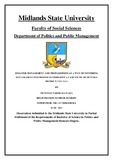Please use this identifier to cite or link to this item:
https://cris.library.msu.ac.zw//handle/11408/3052Full metadata record
| DC Field | Value | Language |
|---|---|---|
| dc.contributor.author | Kawara, Mutongi Tariro | - |
| dc.date.accessioned | 2018-05-18T14:53:01Z | - |
| dc.date.available | 2018-05-18T14:53:01Z | - |
| dc.date.issued | 2017 | - |
| dc.identifier.uri | http://hdl.handle.net/11408/3052 | - |
| dc.description.abstract | The issue of disaster management and preparedness cannot be over emphasized in a world where disasters pose a threat to not only to the lives and livelihoods of communities but also to the environment and development of society. This research is aimed at investigating the various disaster management and preparedness initiatives and their effectiveness in promoting sustainable livelihoods in Zimbabwe with a particular focus on Mutoko District. The research was inspired on the premise that, although hazards are an inevitable phenomenon with unpredictable effects that bare a great magnitude, the adoption and inclusion of effective disaster management and preparedness initiative and policy can reduce the impacts of disasters in order to foster sustainable livelihoods. Additionally, the research was based on the notion that government had a responsibility to communities to ensure effective disaster management and preparedness that would not only help them in times of disasters but could also enhance their capacity and capability in mitigating disasters. Qualitative research design was used to acquire knowledge on the disasters present in the district and research tools mainly interviews, questionnaires and observation were used to measure people‟s attitude towards disaster management and preparedness initiatives in order to analyse the effectiveness of said measures. Thematic analysis was used to analyse data in order to fully comprehend the impacts of disaster and mitigation measures implemented to deal with them. Findings from the research showed that the District Civil Protection which is the main body governing disaster management and preparedness was not well equipped to implement effective measures that enhanced community‟s capacity and capability as data analysis evidently showed that without government reactive measures and the help of civil society and non-profit groups communities are vulnerable to the harsh effects of disasters. The overall research concluded that the district civil protection is lacking in terms of proactive measures to dealing with disasters which are mainly reactive to resolve immediate shocks. | en_US |
| dc.language.iso | en | en_US |
| dc.publisher | Midlands State University | en_US |
| dc.subject | Disaster management | en_US |
| dc.title | Disaster management and preparedness as a way of fostering sustainable livelihoods in Zimbabwe a case study of Mutoko district(2009-2016) | en_US |
| item.languageiso639-1 | en | - |
| item.fulltext | With Fulltext | - |
| item.grantfulltext | open | - |
| Appears in Collections: | Bachelor Of Science In Politics And Public Management Honours Degree | |
Files in This Item:
| File | Description | Size | Format | |
|---|---|---|---|---|
| TABLE OF CONTENTS.pdf | Full Text | 1.3 MB | Adobe PDF |  View/Open |
Page view(s)
14
checked on Jul 26, 2024
Download(s)
26
checked on Jul 26, 2024
Google ScholarTM
Check
Items in MSUIR are protected by copyright, with all rights reserved, unless otherwise indicated.



